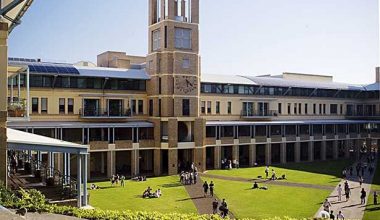We understand that you are a bright student who wants to attend one of the best schools in the U.K., and you’re torn between Cambridge and Oxford. Which is better? Which should you attend?
The truth is, the Cambridge vs. Oxford debate is an interesting one that will give you a fresh burst of insight you never knew. And with these insights, you’ll be able to make the best college choice.
Oxford University and Cambridge University are the oldest universities in the U.K. They are also universities with a larger-than-life reputation, which reflects in their admission rate. Yet students are not satisfied with the fact that these two are the best in the U.K. One has to be better, right? Hence the Cambridge vs. Oxford argument.
So, in this post, we will analyze both schools using ten (10) key points. These points will differentiate both schools for you, and we hope that you will get interesting facts while we discuss each point. Also, we will explain the term “Oxbridge” as well as answer several other questions people are asking on the subject.
The table of contents below highlights all points.
Table of contents
Why Cambridge University?
There is almost no basis for the Cambridge vs. Oxford debate if you don’t know why you should attend any of these colleges. So, here’s a little background about Cambridge University that may convince you to attend the University.
Cambridge University is the second oldest University in the U.K. It began operating as a public research university as far back as 1209. This means that most of the notable historical inventors from the U.K. either attended this University or the first University in the U.K. – Oxford.
Also, Cambridge has consistently maintained high academic standards, which blend with its wealth and rich history to make it one of the most prestigious universities in the world. By this, a degree from Cambridge is one of great value, which employers respect.
Furthermore, Cambridge has 31 constituent colleges and over 100 departments which offer quality programs in almost every field of study. Also, grooming great mathematicians like Sir Isaac Newton Cambridge means to keep producing the best brains the world will ever have.
So, you should consider Cambridge if you fancy yourself making great exploits in the world.
Why Oxford University?
Oxford University is the first University in the U.K. It is so old that historians can’t exactly place a particular date the University began operating as a public research university. They can only say, however, that teachings had been going on at Oxford as far back as 1096.
However, the University grew rapidly from 1167 when Englishmen studying at the University of Paris returned to the U.K. from Henry II’s ban. From then, it grew to become one of the most prestigious universities in the world, with its strong history and great influence.
Furthermore, Oxford has over 30 colleges that control their individual affairs, as well as several departments that offer quality education in almost every field of study. Also, the University has some of the best facilities and faculties that ensure that you become the best you can be in your chosen field.
Additionally, the genius writer J.R.R Tolkien, who wrote Lord of the Rings, attended Oxford’s Exeter College. Coupled with the long list of very influential alumni from Oxford, you can also make your dream of becoming a world figure blossom to life by attending Oxford University.
What is Oxbridge?
You almost can’t talk about Cambridge vs. Oxford without mentioning “Oxbridge.” By merely looking at the word, you can already imagine that it was coined from Oxford and Cambridge. You wouldn’t be wrong if you were thinking in this line.
Oxbridge is the collective term people use when they are talking about Oxford and Cambridge. Because both schools share a lot in common, people refer to both as Oxford. For example, you would explain to a friend who is comparing Oxford and Cambridge to other schools in the U.K. that Oxbridge is a highly competitive school compared to other U.K. colleges.
The name sprung up in 1850 in William Thackeray’s fictional novel “Pendennis.” In this novel, the main character attends the fictional college, “Boniface College, Oxbridge.” The name has stuck since then, and people use it to refer to the features Cambridge and Oxford share in common.
So, in this post, you’ll see us use Oxbridge a lot.
What are the Similarities Between Cambridge and Oxford?
There is a list of features common to Oxbridge which sets them apart from other universities in the U.K.
Here are the major similarities between Cambridge and Oxford.
- They are both the oldest universities in the U.K. that are still running to date and have educated a large portion of Britain’s most prominent people.
- They possess similar institutions and facilities. For example, both have printing houses (Oxford University Press and Cambridge University Press). They also have botanical gardens (the University of Oxford Botanical Garden and Cambridge University Botanical Garden).
- Both Cambridge and Oxford have the same collegiate structure similar to a confederal system. The constituent colleges run their affairs independently, and the University co-operates with them.
- Oxbridge ranks are very high in cross-subject U.K. university rankings. However, their entrance is very competitive.
- Both universities approach undergraduate admissions in the same way. If you wish to apply to Oxbridge, you must submit your application three months earlier than other universities in the U.K.’s application timeline.
Is Cambridge Bigger Than Oxford?
Oxford is bigger than Cambridge. And its campus is livelier than Cambridge’s. With a student population of 150, 000 Oxford’s student community outnumbers Cambridge’s students by -124, 000.
Cambridge vs. Oxford
So, back to the battleground, which University would you choose between Oxford and Cambridge?
We will not tell you which you should attend, but we will give you their differences. Through the ten differences which we provide you below, you’ll be able to make your decision.
Here are the ten (10) points through which we will discuss Cambridge vs. Oxford:
- Global Ranking
- Subject Strength
- Notable Alumni
- Location
- Architecture
- Admission Requirements
- Tuition Fees
- Financial Support
- Employability
- Extracurricular Activities
#1. Global Ranking
While Oxford and Cambridge are arguably the two best universities in the U.K., they also hold a high reputation globally. According to Q.S. World University Rankings, The University of Oxford ranks 4th in the world while the University of Cambridge ranks 7th.
However, in the section for Academics and Employers, Oxford ranks 3rd while Cambridge ranks 2nd. Furthermore, based on the student-to-faculty ratio, Oxford ranks 8th while Cambridge ranks 10th.
Additionally, going to Times Higher Education (THE) World University Rankings, both universities go head-to-head on the top spot. Oxford is the first University in the world, and Cambridge is the second. They are two out of the three U.K. universities occupying the top ten spot – Imperial College London is 9th on the list.
Check out Imperial College of London’s Ranking, Tuition, and Application Procedures
#2. Subject Strength
By subject strength, we mean the subjects these universities offer that is exceptional in the way they deliver them. Q.S. World University has been consistently providing such rankings. So, in the Q.S. World University Rankings by Subjects 2019, Oxbridge university is well represented.
Oxford comes first in the world for the following subjects:
- Anthropology
- Archaeology
- English Language and Literature
- Geography
- Pharmacy
While Oxford ranks 1st in these five subjects, it falls in the top ten spots for thirty (30) other subjects.
Cambridge, on the other hand, comes first in the world for Anatomy and second for the following subjects:
- Anthropology
- Archaeology
- English
- History and Modern Languages
While Cambridge ranks first and second in these five subjects, it maintains the top ten positions for thirty-three (33) other subjects.
Oxbridge QS World University Rankings by Subject 2023
| University of Oxford | University of Cambridge | |
| Accounting & finance | 4th | 8th |
| Anatomy & physiology | 2nd | 1st |
| Anthropology | 1st | 2nd |
| Archaeology | 1st | 2nd |
| Architecture | — | 7th |
| Art & Design | 37th | — |
| Biological sciences | 4th | 3rd |
| Business & management | 10th | 7th |
| Chemistry | 6th | 3rd |
| Classics & ancient history | 2nd | 3rd |
| Computer science & information systems | 6th | 5th |
| Development studies | 3rd | 5th |
| Earth & marine sciences | 5th | 4th |
| Economics | 9th | 10th |
| Education & training | 4th | 5th |
| Engineering (chemical) | 6th | 3rd |
| Engineering (civil) | 16th | 5th |
| Engineering (electrical) | 11th | 5th |
| Engineering (mechanical) | 8th | 3rd |
| English language & literature | 1st | 2nd |
| Environmental sciences | 6th | 8th |
| Geography | 1st | 3rd |
| History | 3rd | 2nd |
| Law | 2nd | 3rd |
| Linguistics | 9th | 6th |
| Mathematics | 6th | 5th |
| Materials science | 7th | 4th |
| Medicine | 2nd | 3rd |
| Modern languages | 3rd | 2nd |
| Performing arts | 9th | 11th |
| Pharmacy | 4th | 6th |
| Philosophy | 4th | 6th |
| Physics & astronomy | 6th | 4th |
| Politics | 2nd | 5th |
| Psychology | 3rd | 4th |
| Social policy & administration | 3rd | 4th |
| Sociology | 2nd | 6th |
| Statistics | 7th | 5th |
| Theology, divinity & religious studies | 3rd | 4th |
| Veterinary science | — | 4th |
To see the full 2024 QS Rankings by Subject, hit the button below:
Are you aware that you can get scholarships to study any subject of your choice in college?
#3. Notable Alumni
If there’s anything that stands out the most in the Oxford vs Cambridge argument, it is their notable alumni. You will want to attend the college your role model attended.
For example, if you fancy yourself becoming a fantasy writer as big as Tolkein, you would want to attend the same university he attended. Sit in the same hall he sat to listen to faculty members lecture, and walk the perimeters of the surroundings he spent four or more years of his youthful life.
Indeed, Tolkien’s fictional world was inspired by his immediate surroundings, which Oxford University may have been part of.
There’s the saying that goes, “Oxford is for learning, Cambridge is for wit.” You’ll agree or disagree with that in the next section where we will discuss the alumni of Oxford and Cambridge universities by subjects.
Cambridge University’s Notable Alumni
From its inception till date, Cambridge has provided great alumni in both the academic field and the wider world. In total, the university has produced 117 Nobel price winners, and its faculty members, alumni, and researchers have won 11 Field Medals and 7 Turing Awards.
Here are Cambridge’s notable Alumni by subject:
- Mathematics and Sciences – Sir Isaac Newton (Popular Scientist); Sir Francis Bacon (Developer of Scientific Method); Charles Darwin (Developer of the Theory of Natural Selection); Stephen Hawkings (Theoretical Physicist); etc.
- Humanities, Music, and Art – John Maynard Keynes (Developer of the Keynesian Theory); Milton Friedman (Developer of Consumption Analysis); Francis Bacon (Philosopher); Ludwig Wittgenstein (Philosopher); Ralph Vaughan Williams (Music Composer), Roger Fry (Artist); etc.
- Literature – Christopher Marlowe (English Playwright); V. M. Thackeray (Author of Vanity Fair); William Wordsworth (Co-author of Lyrical Ballads); Rachel Weisz (Actress); Stephen Fry (Comedian and Actor); etc.
- Sports – Deng Yaping (Table Tennis Champion); Harold Abrahams (Athletics Hero); H. de Winton and J.C Thring (Inventors of the Modern Game of Football).
- Politics – 15 Prime British Ministers including Robert Walpole; Edward VII (Monarch); Thomas Lynch, Jr., Arthur Middleton, and Thomas Nelson, Jr. (Signatories of the United States Declaration of Independence); etc.
You may like to know the Top 21 Universities with the Powerful Alumni Network
Oxford University’s Notable Alumni
Oxford University has had its own fair share of notable alumni and you can call these alumni Oxonians. The university has produced a total of 69 Nobel prize-winners and three (3) Fields Medal (The Nobel Prize for Mathematics).
Here are Oxford’s notable Alumni by subject:
- Mathematics and Sciences – Micheal Atiyah, Daniel Quillen, and Simon Donaldson (Award-winning Mathematicians); Dorothy Hodgkin (Developer of Determinations by X-ray Techniques of the Structures of Important Biochemical Substances); Alfred Marshall, and Adam Smith (Economists); etc.
- Literature, Music, and Drama – John Fowles (Novelist); C.S Lewis (The Chronicles of Narnia); Oscar Wilde (Playwright); J.R.R Tolkien (Author of The Hobbit); Hugh Grant (Actor); Rowan Atkinson (Actor – Mr Beans); etc.
- Sports – Sir Matthew Pinsent (Gold Medal Rower); Michael Blomquist, Ed Coode, Chris Davidge (Rowers); Myron Rolle (NFL Player); Bill Bradley (NBA Player); Alan Jay (Fencer); etc.
- Politics – 28 Prime Ministers including Harold Macmillan; Wiliam II of the Netherlands (International Leader), S. W. R. D. Bandaranaike (former Prime Minister of Ceylon); Pedro Pablo Kuczynski (Former President of Peru); Abhisit Vejjajiva (Former Prime Minister of Thailand); Bill Clinton (the First President of the United States); etc.
- Law – Lords Bingham and Denning (Influential Judges in Common Law); David Neuberger (Former President of the Supreme Court); Thomas Bingham (Lord Chief Justice); etc.
#4. Location
Location plays a very vital role in determining if you’ll attend a particular college. Is the college in an Urban or Rural are? What is the lifestyle of the people there? How close is the school’s campus to the housing facilities?
So, let’s go ahead and analyze oxford and Cambridge’s location.
| University of Oxford | University of Cambridge | |
| Address | Oxford OX1 2JD, United Kingdom | The Old Schools, Trinity Ln, Cambridge CB2 1TN, United Kingdom |
| Location | About 60 miles north-west of London (about an hour by train) | About 60 miles north of London (less than an hour by train) |
| Type of Settlement | City | Town |
| Perception | Natives consider Oxford to be a bit livelier | Natives consider Cambridge to be a bit prettier |
Oxford and Cambridge are small and compact places to live if you’re studying in the UK. You can get to places in these locations easily on foot or by cycling (which is more popular). However, both locations are close to the UK capital, London.
Also, historically, Oxford has been a larger, more urban, and industrial city than Cambridge. It is at Oxford that you get the BMW motor industry. Cambridge is not left out, however. Natives call the area surrounding Cambridge Silicon Fen. This area houses companies like Microsoft, Apple, and Amazon.
Nonetheless, people think Cambridge looks like an agricultural market town than a city, with its green scenery.
#5. Architecture
Another interesting aspect of the Cambridge vs Oxford argument is the architecture. Which is more beautiful between Cambridge and Oxford? This may be a worthless question for some but for others, aesthetics determines the kind of learning they get from college.
So, let’s see what Oxford and Cambridge look like that makes them highly sought universities.
Both Oxford and Cambridge stand near rivers. However, the one river which flows through Cambridge is more prominent than the two rivers – Thames and Cherwell – which flows about the center of Oxford.
Furthermore, Oxford and Cambridge have buildings as ancient as their history yet they differ in style and materials. Oxford’s buildings are uniform, built with local sandstone. On the other hand, Cambridge does not have such uniformity as Oxford. The building materials came from different sources. Thus Cambridge university does not look as ancient as Oxford.
For this reason, Classic European movies like Harry Potter had some of its scenes shot in Oxford – Shadowlands, to be specific. The movie “His Dark Material: Northern Lights” had some of its scenes set in Ratcliffe Square.
#6. Admission Requirements
In terms of admission requirements, there are more similarities in the Oxford vs Cambridge argument than differences. Yet, some differences exist even within their similarities.
First, let’s start with the similarities.
Oxbridge Admission Requirements
Generally, gaining admission to Oxford or Cambridge university is competitive and different from other colleges and universities in the UK. Both Oxford and Cambridge requires prospective students to complete the following requirement.
- Apply for admission in mid-October, usually the 15th of October, instead of the normal mid-January for other UK schools.
- Submit a strong personal statement to distinguish you from the large pool of applicants. This personal statement must portray a passion for your subject, work experience, and independent projects. These are the core qualities/achievements Oxbridge is looking out for.
- Have “A” grades from their secondary schools and college in addition to subject requirements by the college you’re applying to.
- Take admission tests to further distinguish between high-achieving applicants and the achieving applicant.
- Show up for Oxbridge interviews, where field experts will interview them to see if they would fit into the Oxbridge teaching style.
- Fill additional forms such as the Supplementary Application Questionnaire.
Oxford vs Cambridge Admission Requirements
Now we have seen the similarities in the Oxford vs Cambridge argument, let’s take a look at where they vary.
With the help of a table, we will examine the Oxford vs Cambridge Admission Requirement difference using some of the points for which they are similar.
| University of Oxford | University of Cambridge | |
| Grades | You will need to have A*A*A* and AAA grade range at A level entrance, depending on the subject you’re applying for; 30 – 40 points in the International Baccalaureate (IB), including core points; and between 776 and 666 in Higher Level subjects, depending on the subject. | You will need to have A*A*A* for most science courses and A*AA for Art courses at A level entrance; or 40 – 42 points in the IB; and 776 at Higher Level. |
| Admission Test | Applicants take admission tests to determine their admission, especial graduate entry medicine, and biomedical sciences. | Applicants take pre-interview test for around half of its courses, like the Sixth Term Examination Paper (STEP) for Computer Science and Mathematics. Meanwhile, other subjects take pre-interview test when they show up for interview. |
| Interview | Oxford will advise you to stay long in the city after your interview date because another Oxford college may call you for an interview after your original college sees you. | The particular Cambridge College you applied for will invite you for an interview on a certain day and after two-to-four interviews that day, you’re free to go home. |
| Additional Forms | You may not have to fill additional forms after submitting your application. | All undergraduates must complete the Supplementary Application Questionnaire (SAQ) |
#7. Tuition Fees: Is Oxford or Cambridge Cheaper?
Oxbridge charges one of the highest tuition fees in the UK for its quality education, yes.
However, let’s compare Oxford’s and Cambridge’s fees for undergraduate and postgraduate UK/EU and Non-EU students.
Oxford’s Tuition Fees
If you’ll be joining Oxford for the October batch, here’s how much you’ll pay:
| UK/EU Students | Overseas Students | |
| Undergraduates | £9,250 | Between £25,740 and £36,065 (Overseas); £9,250 (Islands) |
| Graduates | £13,075 (MSc); £14,765 (DPhil). | £23,505 (MSc); £24,910 (DPhil). Islands students pay same as UK/EU students. |
Cambridge’s Tuition Fees
Students joining Cambridge University in the 2024 academic year will be paying the following as tuition fees:
| UK/EU Students | Overseas Students | |
| Undergraduates | £9,250 | Between £21,168 and £55,272 |
| Graduates | £10,680 (MAst); £8,589 to £14,688 (MPhil); £8,589 (PhD). | £21,411 (MAst); £26,208 to £34,296 (MPhil); £24,531 to £30,813 (PhD). |
You can study a Master’s or PhD program as an International student at the University of Cambridge with the Gates Cambridge Scholarships For International Masters & PhD Students.
#8. Financial Aid and Scholarships
Scholarships and financial aid are other basis students consider in the Oxford vs Cambridge debate. With the high tuition, especially for overseas students, do Oxford and Cambridge provide educational funding support?
Oxford Financial Aid and Scholarships
The University of Oxford provides a generous sum of around £8 million in the form of financial support to undergraduate students. However, these funds are majorly for UK and EU students.
Nonetheless, Overseas or International students at Oxford are not entirely stranded as regards scholarships. A few numbers of scholarships exist for them, especially for students from the Asia continent.
See all the University of Oxford Scholarships and Bursaries for Undergraduates by clicking Oxford scholarships.
Cambridge Financial Aid and Scholarships
The University of Cambridge, like Oxford, provides the majority of its scholarships for UK and EU students, especially UK students. Cambridge’s scholarships to undergraduate students are in the form of Government Financial Support and Cambridge Financial Support.
The government’s financial support is of four (4) types. Student Finance England and Non-UK Team, Student, Awards Agency Scotland (SAAS), Student Finance Wales, and Student Finance NI.
Meanwhile, through the Cambridge Financial Support, students can be able to access financial aid. These scholarships are mostly those the individual college’s departments offer. However, these scholarships are usually based on academic achievements.
View all the University of Cambridge’s undergraduate scholarships by clicking on your preferred button below.
While it may be difficult to get an Oxbridhe scholarship fpor international students, we have International Scholarships for you.
#9. Employability
One of the major advantages of attending Oxbridge is the preference it gives you when it comes to employment. Employers don’t place your CV above others based on mere sentiments. No, they understand the quality of education you have acquired and years of employing Oxford graduates like you who delivered is enough to sway them to your favour.
Meanwhile, let’s discuss it; who is more employable between the Oxford and Cambridge graduate?
In 2018, Times Higher Education (THE) in their Top Universities in the UK Ranked by Employers ranked Cambridge University first and Oxford second.
They attributed Cambridge’s position to the large network of influential alumni worldwide in addition to the university’s teaching system.
For Oxford, their ranking came from the university’s commitment to developing digital technology and communication. Thus, Oxford’s graduates are exposed to important research and innovations that are highly beneficial to the workplace.
Furthermore, QS while giving both universities’ graduates a 100% employability rate, the University of Cambridge ranks 8th in their employability ranking, while the University of Oxford ranks 10th in the world.
#10. Extra-curricular Activities
You know, it’s not all academics in Oxbridge. Extra-curricular activities are at the heart of Oxbridge education. With its large student body. However, you may have to involve in curricular activities related to your course of study. Like, if you’re majoring in mathematics, you should regularly participate in the mathematics olympiad.
Cambridge Extra-Curricular Activities
There are tons of extra-curricular activities at Cambridge University that students can involve themselves in to cool off the steam of academics. These activities are in the categories of sports, political societies, academic societies, and Drama Societies. There are also student unions, miscellaneous societies, college clubs and societies, and leisure activities.
Generally, however, the Rowing and Boat Clubs are the most prominent extracurricular activities in Cambridge. There are a lot of Boat Clubs by the Cambridge Colleges participating in Boat Races.
Also, another highlight of Cambridge (and Oxford) extra-curricular activities is the Varsity Match. This is an annual match for each Cambridge sports team against each sports team from the University of Oxford.
Oxford Extra-Curricular Activities
At the University of Oxford, there are over 400 clubs and society stretched over a wide variety of students interest. These activities are in the following categories:
You see, there’s a place for every kind of Oxford student, even the newcomers.
However, like Cambridge, a major extra-curricular highlight is the annual Boat Race, where Oxford University competes with Cambridge University.
- Students Union
- University Sports – 83 Sports Club
- Clubs and Societies – Over 150 societies
- Oxford Union (Debating Society)
- Common Rooms that run social events
- Media – Cherwell, Oxford Students, and Isis Magazine
- University Club
- Oxford Newcomers’ Club
Oxford vs Cambridge Boat Race
The Oxford vs Cambridge Boat Race is a competition that Oxbridge students look forward to every year. Since its inception in 1829, it seems the competition gets more interesting each new year.
The competition involves Cambridge University Boat club competing against Oxford University Boat Club over a four-mile (6km) stretch of the River Thames, one of the rivers flowing around the two cities.
The University of Oxford won the first edition of the race, but as it is predicted in the Bible, the first has become the last in the overall win. Not with a large margin, anyway. Cambridge leads on the overall win with 83 wins while Oxford follows closely behind with 80 wins.
Just as the overall win has is with a small margin, so has the winning margin in the recent races been. In 2003, Oxford won the race by the shortest margin ever of 1-foot (0.30 m). The following year, however, Cambridge snatched the title back from them with Oxford screaming foul.
The excitement never ends with the Oxford vs Cambridge Boat Race and you too can participate in the next boat race once you decide on the Oxbridge side to enroll in.
Oxbridge Collegiate System
Like we explained earlier, both Oxford and Cambridge operate a Collegiate System of learning. In this system, the university has several independent colleges that form the university.
These colleges are more like academic communities where Oxbridge students have their tutorials. But they are more than tutorial colleges. Each Oxbridge college has its own own dining hall, bar, common room and library, and lots of college groups and societies.
So, how many colleges do the University of Oxford have? and how many colleges make up the University of Cambridge?
The University of Cambridge has 31 Colleges, while the University of Oxford has 33 colleges.
In the next section, you will see the full list of these colleges with the links to visit the college embedded on their names. All you have to do is click on the name of each college to explore.
List of Oxbridge Colleges
See the table below for a list of Oxbridge Colleges.
Attending Cambridge Trinity? Have yoiu seen this Cambridge University Trinity College Bursaries for Masters?
Oxford or Cambridge FAQs
Both Cambridge and Oxford are renowned universities in the UK, with a long history of excellence in education. But there are some key differences between them.
One of the main distinctions is that Cambridge has 31 colleges, while Oxford has 38. This means that although both universities offer an incredible range of courses, you might find a wider variety of options at Oxford. Another difference is that at Cambridge, lectures are typically held in large groups, while at Oxford they’re often held as small tutorials or seminars. So if you prefer more personalised instruction, then Oxford may be the better choice for you.
Finally, when it comes to campus life and social activities, both universities have plenty to offer. But Cambridge tends to be more focused on academic pursuits and traditional collegiate sports like rowing and cricket, whereas Oxford offers an array of clubs and societies for students to get involved in.
When it comes to deciding between Cambridge and Oxford, it really depends on what you are looking for in a university. Both universities have a lot to offer and are incredibly prestigious institutions.
One of the main benefits of choosing Cambridge over Oxford is its reputation for excellence in research. The university has some of the best research facilities in the world, and its faculty members are experts in their respective fields.
Additionally, Cambridge offers a wide range of courses and programs that can help you specialize in your chosen field.
Another benefit of choosing Cambridge is its student-friendly atmosphere. The university encourages students to explore their passions and pursue their interests outside of academics. It also has an extensive network of support services that can help students succeed both academically and personally during their time at Cambridge.
It’s hard to say which one is better for living, as both Cambridge and Oxford are amazing cities with so much to offer.
From a cultural perspective, Cambridge has plenty of museums and galleries, while Oxford boasts some of the oldest libraries in the world. Both cities have vibrant nightlife and an array of restaurants, cafes and shops.
In terms of location, Cambridge is closer to London while Oxford is close to Birmingham. So if you’re looking for easy access to a larger city, this could be a deciding factor in your choice. Ultimately, it comes down to personal preference – both cities are great places to live.
Conclusion
Cambridge and Oxford are undoubtedly one of the best universities to attend in the UK. However, they are very competitive universities which don’t allow students to apply to them in the same academic cycle. So, you will have to choose which you will apply for come October.
To aid your decision, however, weigh both universities based on their world ranking, subject strength, alumni network, employability, and even their extra-curricular activities.
References
- University of Oxford – A-Z of colleges
- University of Cambridge – Colleges and departments
- Wikipedia – Oxford–Cambridge rivalry
- QS Top Universities – University of Oxford
- QS Top Universities – University of Cambridge
- Times Higher education – Graduate employability: top universities in the UK ranked by employers 2023
- Times Higher Education – World University Rankings 2023
- QS Top Universities – Oxford or Cambridge?
- UniAdmissions – OXFORD VS CAMBRIDGE: WHICH IS BETTER?
- Wikipedia – Oxbridge
- The University of Oxford – Course fees for 2024-entry
- The University of Oxford – MSc in Applied Linguistics and Second Language Acquisition
- University of Cambridge – Undergraduate Study: International Fees and Costs
- University of Cambridge – Graduate Admissions: Fees
- The University of Oxford – DPhil in Archaeological Science
We Also Recommend
- Study in University of Sydney: Admission, Tuition Fees, Courses and Rankings
- 15 Low tuition Universities for Undergraduates And Postgraduates in the UK
- Ongoing 6-months bachelor degrees for International Students
- Step by Step Guide on how to become a Mechanic
- University of York: Admission, Tuition, Courses, Scholarships, Ranking
- Rhode Island College: Tuition Fees, Scholarships & Cost of Living
- University of Cambridge Scholarship Opportunities
- Rhodes Scholarships for Sierra Leone Students
- Woolf Institute Cambridge PhD Scholarships for International Students in the UK
- Cambridge Trust International PhD Scholarships





